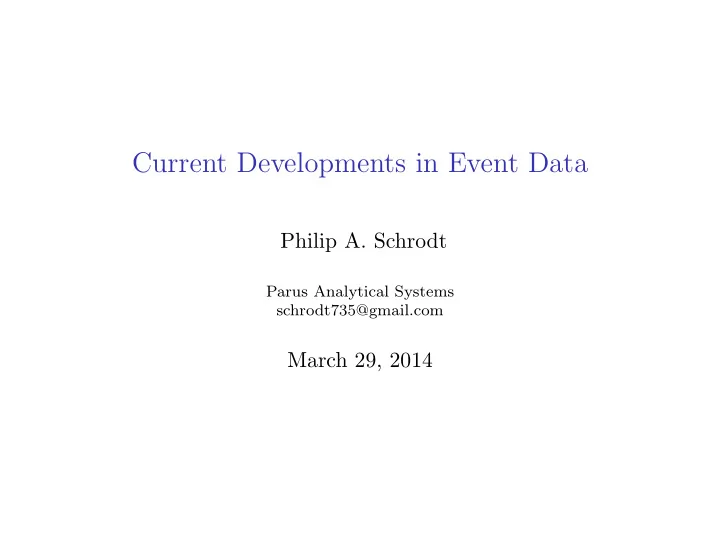

Current Developments in Event Data Philip A. Schrodt Parus Analytical Systems schrodt735@gmail.com March 29, 2014
Overview It was the best of times, it was the worst of times, it was the age of wisdom, it was the age of foolishness, it was the epoch of belief, it was the epoch of incredulity, it was the season of Light, it was the season of Darkness, it was the spring of hope, it was the winter of despair, we had everything before us, we had nothing before us. Charles Dickens. A Tale of Two Cities
Paradox There is now tremendous interest in event data ◮ 100 participants in GDELT Gallup “hackathon” in December 2013 Researchers are reluctant to use ICEWS because it is too expensive ◮ $50-million in US government investment ◮ Privatized version is being marketed at $150,000 per country Researchers are reluctant to use GDELT because it is free
WTF???
Welcome to the new normal ◮ Rifkin [NYT March 2014]: The most disruptive technologies in the current environment combine network effects with zero marginal cost ◮ Key: zero marginal costs: open source software is “free-as-in-puppy” ◮ Examples ◮ Operating systems: Linux ◮ Statistical software: R ◮ Encyclopedia: Wikipedia ◮ Commercial photography: Shutterstock (55K photographers; 30K new images per day) vs Getty Images in $5B/year market
Enterprise models Twentieth-century: control as much of the environment as possible IBM, Microsoft, Apple, Oracle, Dell “You will be assimilated” Twenty-first-century: build the structure, users provide the content Google, eBay, Twitter, Facebook, post-2000 Amazon YouTube, Pintrest, Reddit, Yelp, TripAdvisor, AirBNB
Open source models Charismatic leadership Emacs, GNU (Stallman), perl (Wall), early Linux (Torvalds) T EX(Knuth) Organizational (profit or not-for-profit) development FireFox, Apache, Android, mySQL,SourceForge, later Linux (IBM, RedHat, Ubuntu) OpenOffice/LibreOffice (also motivated by loathing of Microsoft) Community development L A T EX, R, Python, Arduino micro controller, Raspberry Pi single-board computer, 3D printing
EL:DIABLO Event Location: Dataset in a Box, Linux Option ◮ Full modular open-source pipeline to produce daily event data from web sources ◮ Scraper from white-list of RSS feeds and web pages ◮ Event coding from any of several coders: TABARI, PETRARCH, others ◮ Geolocation: Penn State “GeoVista” project coder, UT/Dallas coder ◮ Conventional reduplication keeping URLs of all duplicates ◮ Additional feature detectors are easily added
PETRARCH ◮ Python ◮ Full parsing using the Penn Treebank format and Stanford Core NLP ◮ Synonym sets from WordNet ◮ Identifies actors even if they are not in the dictionaries ◮ Extendible through program “hooks”: “issues” facility
Sources for historical texts ◮ LDC Gigaword 2000-2010; easily licensed ◮ SPEED (Cline Center, University of Illinois at Urbana-Champaign) ◮ Usual proprietary sources, but these are awkward and expensive ◮ Collective resources: in the US, coded data on facts does not inherit the IP constraints of the source ◮ Discussion of legal issues for US: http://asecondmouse.wordpress.com/2014/02/14/the-legal- status-of-event-data/
Open Event Data Alliance ◮ Institutionalize per CRAN and many other groups ◮ 24/7/365 data reliability ◮ Common standards ◮ Open source, open access
What is to be done? Goldilocks solution: There is a lot of space between $50-million and free Try to generate network effects comparable to those of L A T EX, R , Python and numerous other scientific communities Parallel but compatible efforts: ◮ the era of “one data set to rule them all” has ended. ◮ At some point alternative coding decisions are trade-offs , not right/wrong. ◮ Survey research matured in this fashion: this enables ensemble “poll of polls” methods
Thank you Email: schrodt735@gmail.com Software: https://github.com/openeventdata Software: https://openeventdata.github.io/ Papers: http://eventdata.parusanalytics.com/papers.dir Slides: http://eventdata.parusanalytics.com/presentations.html
Recommend
More recommend